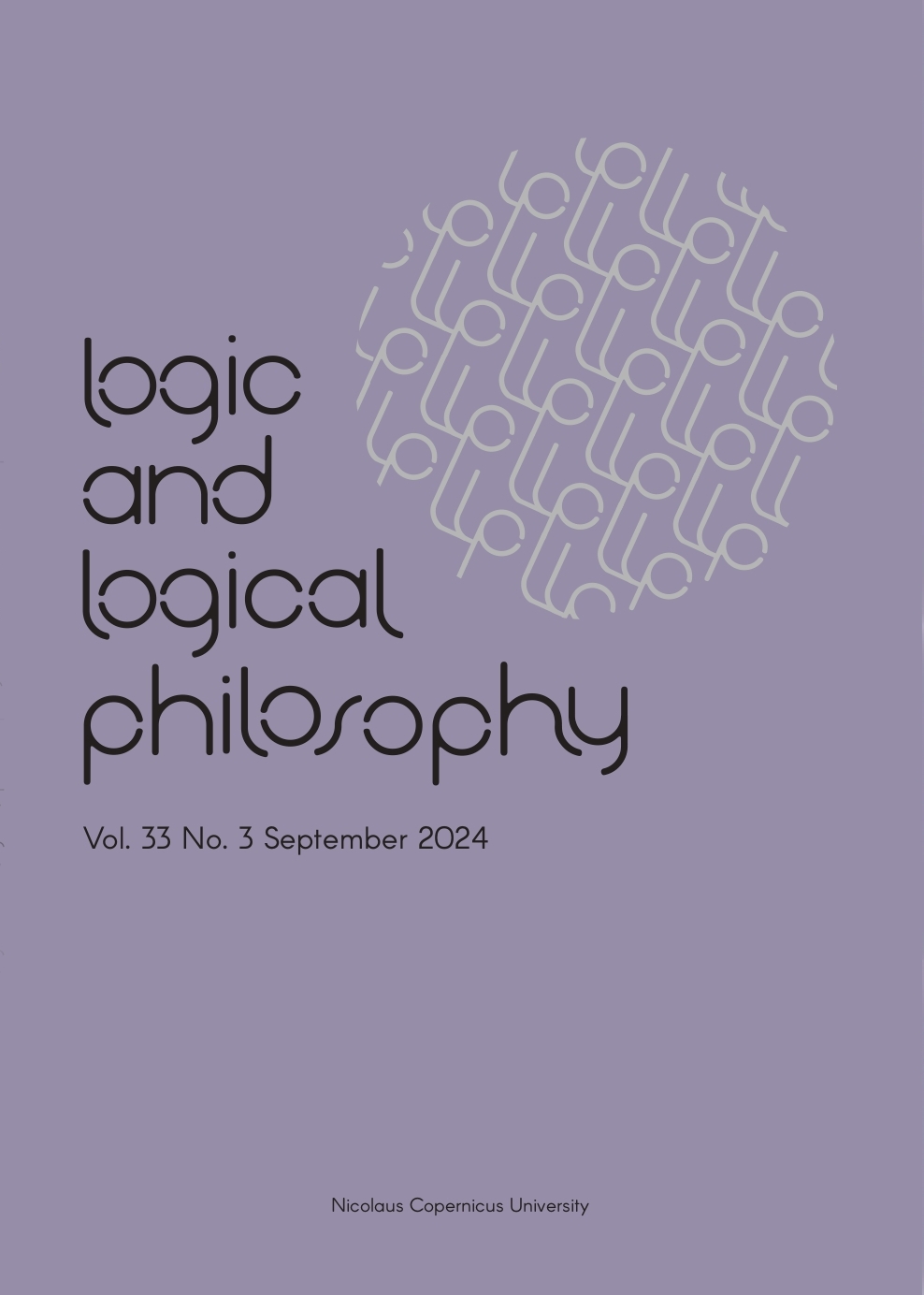Justification Logic and the Epistemic Contribution of Deduction
DOI:
https://doi.org/10.12775/LLP.2024.011Keywords
epistemic contribution, propositional logic, ; justification logic, deductionAbstract
Accounting for the epistemic contribution of deduction has been a pervasive problem for logicians interested in deduction, such as, among others, Jakko Hintikka. The problem arises because the conclusion validly deduced from a set of premises is said to be “contained” in that set; because of this containment relation, the conclusion would be known from the moment the premises are known. Assuming this, it is problematic to explain how we can gain knowledge by deducing a logical consequence implied by a set of known premises. To address this problem, we offer an alternative account of the epistemic contribution of deduction as the process required to deduce a conclusion or a theorem, understanding such a process not only in terms of the number of steps in the derivation but also, more importantly, in terms of the reason for or justification for every step. That is, we do not know a proposition unless we have a justification or proof of that proposition. With this goal in mind, we develop a justification logic system which exhibits the epistemic contribution of a deductive derivation as the resulting justified formula.
References
Abramsky, S, 2008. Information, processes and games. Pages 483–549 in P. Adriaans and J. van Benthem, editors, Philosophy of Information, Handbook of the Philosophy of Science. North-Holland, Amsterdam. DOI: http://dx.doi.org/10.1016/B978-0-444-51726-5.50017-0
Alekhnovich, M., S. Buss, S. Moran, and T. Pitassi, 2001. Minimum propositional proof length is np-hard to linearly approximate. The Journal of Symbolic Logic, 66(1): 171–191. DOI: http://dx.doi.org/10.2307/2694916
Arora, S., and B. Barak, 2009. Computational Complexity: A Modern Approach. Cambridge University Press.
Artemov, S., 1994. Logic of proofs. Annals of Pure and Applied Logic, 67(1–3): 29–59.
Artemov, S., 1995. Operational modal logic. Technical Report 29, Mathematical Sciences Institute, Cornell University.
Artemov, S., 2008. The logic of justification. The Review of Symbolic Logic, 1(4): 477–513. DOI: http://dx.doi.org/10.1017/S1755020308090060
Artemov, S., and M. Fitting, 2019. Justification Logic: Reasoning with Reasons. Cambridge University Press.
Artemov, S., and R. Kuznets, 2009. Logical omniscience as a computational complexity problem. Pages 14–23 in Proceedings of the 12th Conference on Theoretical Aspects of Rationality and Knowledge. TARK.
Artemov, S., and R. Kuznets, 2014. Logical omniscience as infeasibility. Annals of Pure and Applied Logic, 165(1): 6–25.
Artemov, S., and E. Nogina, 2005. Introducing justification into epistemic logic. Journal of Logic and Computation, 15(6): 1059–1073.
Carnap, R., and Y. Bar-Hillel, 1952. An outline of a theory of semantic information. Technical Report 247, Research Laboratory of Electronics, Massachusetts Institute of Technology.
Cohen, M., and E. Nagel, 1934. An introduction to logic and scientific method. Routledge and Kegan Paul.
Cook, S. A., 1971. The complexity of theorem-proving procedures. Pages 151–158 in Proceedings of the Third Annual ACM Symposium on Theory of Computing.
D’Agostino, M., and L. Floridi, 2009. The enduring scandal of deduction: Is propositional logic really uninformative? Synthese, 167: 271–315. DOI: http://dx.doi.org/10.1007/s11229-008-9409-4
Dummett, M. A. E., 1978. Truth and Other Enigmas. Harvard University Press.
Duží, M., 2010. The paradox of inference and the non-triviality of analytic information. Journal of Philosophical Logic, 39(5): 473–510.
Goetschi, R., 2012. On the Realization and Classification of Justification Logics. PhD thesis, University of Bern.
Hintikka, J., 1970. Information, deduction, and the a priori. Nous, 4(2): 135–152. DOI: http://dx.doi.org/10.2307/2214318
Łukasiewicz, J., 1964. Elements of Mathematical Logic. New York: Macmillan.
Łukasiewicz, J., 1970. Selected Works. North Holland Publishing Company.
Mill, J. S., 1843. Mill, A System of Logic, Ratiocinative and Inductive, Being a Connected View of the Principles of Evidence and the Methods of Scientific Investigation. Longmans, Green, and Co.
Parikh, R., 2008. Sentences, belief and logical omniscience, or what does deduction tell us? The Review of Symbolic Logic, 1(4): 459–476. DOI: http://dx.doi.org/10.1017/S1755020308090059
Primiero, G., 2007. Information and Knowledge: A Constructive Type-Theoretical Approach. Springer Science & Business Media.
Rumfitt, I., 2008. Knowledge by deduction. Grazer Philosophische Studien, 77(1): 61–84. DOI: http://dx.doi.org/10.1163/18756735-90000844
Sequoiah-Grayson, S., 2008. The scandal of deduction. Journal of Philosophical Logic, 37(1): 67–94. DOI: http://dx.doi.org/10.1007/s10992-007-9060-4
van Benthem, J., and M. Martinez, 2008. The stories of logic and information. Pages 217–280 in P. Adriaans and J. van Benthem, editors, Philosophy of Information, Handbook of the Philosophy of Science. North-Holland, Amsterdam. DOI: http://dx.doi.org/10.1016/B978-0-444-51726-5.50017-0
Downloads
Published
How to Cite
Issue
Section
License
Copyright (c) 2024 Nancy Abigail Nuñez Hernández, Francisco Hernández-Quiroz

This work is licensed under a Creative Commons Attribution-NoDerivatives 4.0 International License.
Stats
Number of views and downloads: 1217
Number of citations: 0







